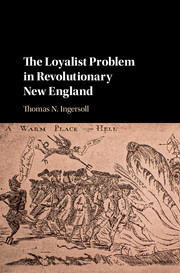The Loyalist Problem in Revolutionary New England
Langue : Anglais
Auteur : Ingersoll Thomas N.

A new history of Loyalism using revolutionary New England as a case study.
The Loyalist Problem in Revolutionary New England begins with a snapshot of the region on the eve of the Boston Tea Party. The colonists' Republican tradition helped them spark the Revolution, but their special history also threatened the unity of the United States throughout the Revolutionary War, for Loyalists tried to discredit New Englanders as a naturally rebellious people. Yet Ingersoll shows that the rebels never sought to drive the dissenters out of the new nation, and accorded them a remarkable degree of liberal toleration, with the great majority of Loyalists ultimately becoming citizens of the new states.
Introduction. History, revolutionary ideology, and the Loyalist problem; Part I. New England in December, 1773: 1. The New England people in their towns on December 16, 1773: a historic mission at risk; 2. Loyalists and Oliver Cromwell's ghost: the problem of the radical tradition in 1773; 3. 'A moral distemper in the British Government': Loyalists, the ruling class, and the mailed fist; Part II. From the Boston Tea Party to the War of Independence: 4. Rebels and Loyalists from December 16th, 1773 to September 1774; 5. 'The attempts of a wicked administration to enslave America': the peace of the towns destroyed and the Loyalist cause, September, 1774 to April 19, 1775; 6. 'Avoid blood and tumult': Loyalist policy during the war; Part III. The Loyalist Problem and Ideology after 1776: 7. The radical critique of Tory oligarchy, slavery, and patriarchy; 8. The 'ugly question' of confiscation; 9. 'A day of strict reckoning' for 'a multitude of subtil enemies'?: New England Loyalists after 1783; Conclusions.
Thomas N. Ingersoll is Associate Professor at Ohio State University, Lima. His first book was Mammon and Manon in Early New Orleans: The First Slave Society in the Deep South, 1718–1819 (1999). In To Intermix with our White Brothers: Indian Mixed Bloods in the United States from Earliest Times to the Indian Removals (2005), he explores the social and political problems created by racial mixture. His guiding interest is how people in early America defined legitimate membership in society, who had rights and who did not.
Date de parution : 10-2016
Ouvrage de 314 p.
16x23.5 cm
Disponible chez l'éditeur (délai d'approvisionnement : 14 jours).
Prix indicatif 63,71 €
Ajouter au panierThème de The Loyalist Problem in Revolutionary New England :
© 2024 LAVOISIER S.A.S.



